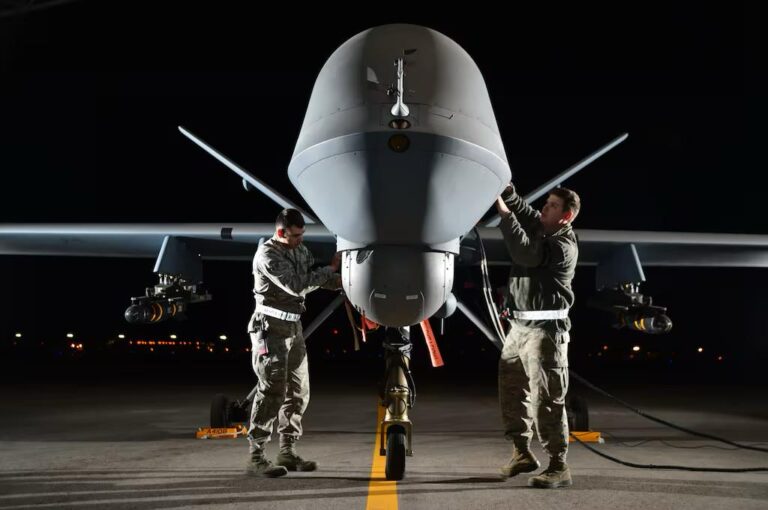Tetouan – Washington has unilaterally reinterpreted a decades-old arms control agreement in order to facilitate a substantial deal between the US and Gulf powers, namely Saudi Arabia and the UAE.
The $142 billion deal, requested by the Saudi kingdom and drafted in May of this year, secures the sale of over 100 MQ-9 drones, or “reapers.”
These specific drones have been coveted by the US’ most significant weapons importers, but a decades-old pact has long curbed the export of the drones.
The technicalities make the deal possible
The Missile Technology Control Regiment (MTCR) is a voluntary agreement between 35 countries signed in 1987. The deal essentially prohibits the sale of long-range ballistic missiles between member countries, and large military drones, like the Reapers.
The agreement states that the sale of drones is subject to a “strong presumption of denial,” and though deals can technically be made under ‘desperate’ circumstances, it is seriously discouraged.
The bulk of the MCTR agreement boils down to the semantics: Category I weapons are strongly restricted, while Category II weapons — short range and lighter payload systems — can be exported under tighter controls.
US President Donald Trump recently tweaked the technicalities and reclassified the category of the MQ-9 drone, essentially placing the drones in the same control bracket as F-16 fighter jets, allowing more leniency in the buying and selling of the drone.
The redefining of the weapons’ classification allows Washington to sidestep the missile-control agreement prohibitions.
Who benefits, who’s threatened
Trump further reinterpreted the language and technicalities on the domestic level. The new definition of these weapons labels the sales as “Foreign Military Sales,” which hands vetting powers to the US State Department. Weapons deals are loosened subject to what the department seems fit.
Major weapons manufacturers like General Atomics, Kratos, and Anduril, are expected to benefit from easier sales pipelines and a sturdy political shield.
Typically, the US’ drone manufacturers face competition from Israeli, Chinese, and Turkish manufacturers. The reclassification allows the US the same privilege of lighter sale restrictions, like its rivals.
Implications on the MENA scale
The deal comes amidst questioning and skepticism about the positioning, priorities, and role of Gulf powers in the region.
The recent Doha Arab-Islamic Summit called for regional unity after Israel’s September 9 strike, which was condemned as an egregious and flagrant violation of Qatar’s sovereignty. Calls for de-normalization with Israel and intervention on behalf of the Palestinian people came alongside the US’ weak condemnation of Israel’s actions in Doha. This was especially notable, drawing sharp criticism as Qatar is a significant military ally to the US.
Yesterday, the United Nations confirmed what the world has known for years but substantial action has not yet been taken – Israel is committing genocide in Gaza. Amidst these desperate times, Arab countries are calling for regional unity now, more than ever.
The new arms deal presents questions on the economic, political, defensive, and symbolic stance of the region’s superpowers.


